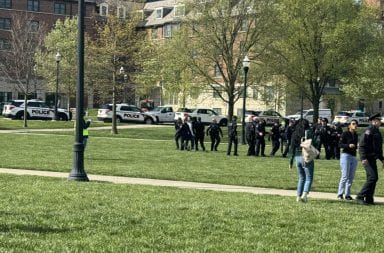
Ohio State students and members of the community gathered for the annual National Eating Disorders Association walk to raise money and awareness for eating disorders. Credit: Jasmine Hilton | Lantern Reporter
On Saturday, Body Sense OSU, a student organization that promotes body positivity, organized the ninth-annual National Association of Eating Disorders Walk in Columbus.
More than 500 Ohio State students and community members gathered outside the RPAC and walked around the Oval to raise awareness about the harm and prevalence of eating disorders in the U.S.
“Eating disorders are the deadliest of all mental illnesses, yet they are significantly underfunded,” Erica Nymberg, Body Sense OSU NEDA coordinator and fourth-year in health sciences, said. “There’s a lot of stigma around eating disorders, and [NEDA walks] help raise awareness. It’s really great to bring it to a campus, so you can expose everybody to this important cause.”
Lauren Evans, co-president of Body Sense OSU and third-year in Spanish, said eating disorders are stigmatized even within the mental health community because people view it as a lifestyle choice rather than a psychiatric illness.
According to NEDA’s website, this year’s Columbus walk raised nearly $29,000 of its $30,000 goal as of publication and will continue to collect donations for another month. Body Sense OSU was the top fundraiser with more than $5,300.
“By putting on this walk, we’re able to raise money for eating disorder research, ” Alex Korodi, co-president of Body Sense OSU and fourth-year in speech and hearing science, said. “We’re able to raise money for people that can’t afford treatment, and it’s just overall good visibility for a good cause.”
Before participants began their walk, two eating disorder survivors shared their emotional testimonies with the crowd.
“The odds and the health complications were certainly stacked against me, yet after all I’ve been through, I’m still here,” Jessica Lucas, a mental health advocate, said. “In [two] days, I celebrate yet another milestone. This year I’m celebrating my 41st birthday, and I still refuse to give up fighting.”
Angelo Thomas, advocate and filmmaker, said he saw a disconnect between what he looked like and what he thought a gay man should like when he started battling anorexia.
“My eating disorder became synonymous with my identity,” Thomas said. “Anorexia was literally and figuratively eating me alive.”
After receiving treatment, Thomas became a spokesperson for the Center for Balanced Living and an ambassador for the National Association of Anorexia Nervosa and Associated Disorders.
“For the people that didn’t make it, I feel like I can be a voice for them,” Thomas said. “I can share their stories because they can’t.”
Many participants remembered loved ones who have died in their battle with eating disorders and uplifted one another by sharing words of encouragement through posters and messages.
“It’s just crazy to see how far I’ve grown personally from how I was my sophomore year, when I was in the middle of having an eating disorder, to taking over such a leadership position and being able to say that I’ve recovered and being able to help other people recover,” Korodi said.
The walk featured tables from Columbus treatment centers to help connect people with mental health services and included Eating and Behavioral Health Associates, the Center for Balanced Living and Eating Recovery Center.
Lucas said during her testimony she never forgets the blessing and miracle of having a beating heart.
“After 25 years of struggling, praying and fighting, here I am with you: hopeful,” Lucas said. “I’m here to tell you no one is a lost case. No one’s past or story disqualifies them for health, healing, longevity and love.”
If you or anyone you know is struggling with an eating disorder, they can visit NEDA’s website or call their hotline at (800) 937-2237.
The Engaged Scholars logo accompanies stories that feature and examine research and teaching partnerships formed between The Ohio State University and the community (local, state, national and global) for the mutually beneficial exchange of knowledge and resources. These stories spring from a partnership with OSU’s Office of Outreach and Engagement. The Lantern retains sole editorial control over the selection, writing and editing of these stories



